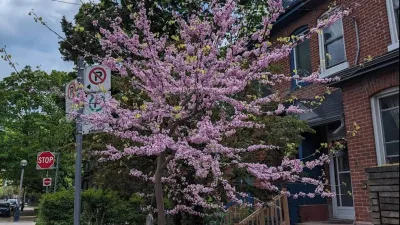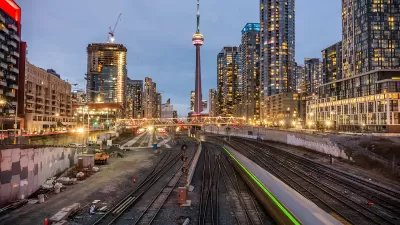A group of "urban hacktivists" have been busy transforming Toronto's ubiquitous and ironically named "info pillars" (read: street billboards) into community platforms and art pieces, protesting their improper design and instillation.
Earlier this month, Toronto residents may have noticed the ads in their street billboards replaced with "playful items such as entire bikes, art maps, and even chalkboard space for public contributions," writes Emma Chow. Apparently the hacktivism project is not simply an art exercise, but a protest against "the erosion and privatization of public spaces" and for the billboards' circumvention of the City's approved Vibant Streets Guidelines.
The group responsible for hacking 35 advertisement signs across Toronto, cARTographyTO, seems to have been formed in direct response to the actions of the city and advertising company Astral Media, who removed trees and bike racks "at the comapany's whim" when installing their signs.
A spokesperson for cARTographyTO stated, "These
structures are billboards masquerading as sources of useful public
information. When you look at the pillars, it's hard to find the maps,
and this goes against the City's own public space guidelines. How could
City Hall allow this to happen? Beyond mere visual pollution, these
pillars are a safety hazard. And Astral's influence on our city is a
public insult and embarrassment - more power has been given to those who
already have the loudest voices, to the detriment of all who use these
spaces."
FULL STORY: Urban Hacktivists Take Over Street Ads In Toronto

Planetizen Federal Action Tracker
A weekly monitor of how Trump’s orders and actions are impacting planners and planning in America.

Congressman Proposes Bill to Rename DC Metro “Trump Train”
The Make Autorail Great Again Act would withhold federal funding to the system until the Washington Metropolitan Area Transit Authority (WMATA), rebrands as the Washington Metropolitan Authority for Greater Access (WMAGA).

The Simple Legislative Tool Transforming Vacant Downtowns
In California, Michigan and Georgia, an easy win is bringing dollars — and delight — back to city centers.

The Small South Asian Republic Going all in on EVs
Thanks to one simple policy change less than five years ago, 65% of new cars in this Himalayan country are now electric.

DC Backpedals on Bike Lane Protection, Swaps Barriers for Paint
Citing aesthetic concerns, the city is removing the concrete barriers and flexposts that once separated Arizona Avenue cyclists from motor vehicles.

In These Cities, Most New Housing is Under 441 Square Feet
With loosened restrictions on “micro-housing,” tiny units now make up as much as 66% of newly constructed housing.
Urban Design for Planners 1: Software Tools
This six-course series explores essential urban design concepts using open source software and equips planners with the tools they need to participate fully in the urban design process.
Planning for Universal Design
Learn the tools for implementing Universal Design in planning regulations.
Smith Gee Studio
City of Charlotte
City of Camden Redevelopment Agency
City of Astoria
Transportation Research & Education Center (TREC) at Portland State University
US High Speed Rail Association
City of Camden Redevelopment Agency
Municipality of Princeton (NJ)





























